Gum disease, a common infection in the gum tissue, affects about half of American adults. Natural oral bacteria can easily reach the gums and infect the area without proper oral health care. Then the infection can eat away at the gums and access the teeth and jaw to create extensive damage to your smile.
But this oral infection can cause many other health concerns throughout the rest of your body. Inflammation in the gums from the infection will trigger the body’s inflammatory response, which can make other areas of the body more vulnerable as it attempts to heal the damaged gum tissue.
Studies also indicate that inflammation releases molecules that can encourage the formation of cancerous cells. And research suggests that gum disease in particular links to colon and gastric cancer because they share similar bacterial presences along with the initiation of the inflammatory response.
Chronic inflammation, such as from gum disease, can therefore put you at a greater risk of cancer. Treating gum disease promptly and making efforts to prevent contracting the infection are crucial if you want to protect your overall well-being as well as your oral health. Read on to learn more about gum disease, its treatment, and its prevention.

Treatment for Gum Disease
When your dentist diagnoses you with gum disease, they can start treatment right away. They will begin by thoroughly cleaning your teeth, scraping away excess bacteria and plaque buildup, especially near the gumline. This extensive cleaning method is known as scaling and root planing.
If gum disease persists after periodontal therapy, you may need more intense treatment to eradicate the infection. Your dentist may suggest oral surgery to remove damaged gum tissue.
The dentist might also recommend an antibacterial rinse to balance your natural oral bacteria. This can reduce your risk of further harm from bacterial infection. Gum disease will not go away on its own, so reach out to your dentist for help treating this concern.
Gum Disease Prevention Tips
For many dental patients, gum disease presents with noticeable symptoms like bleeding, soreness, or swelling in the gum tissue. But gum disease can also develop without symptoms at all. For this reason, you should visit your dentist for regular check-ups that include periodontal disease screenings.
The sooner your dentist diagnoses this infection, the quicker they can treat it. Gum disease is easier to treat when caught early, so do not delay routine dental care.
You can reduce your risk of contracting gum disease in the first place by practicing good oral hygiene. These efforts will remove plaque in a timely fashion before it allows bacteria to spread and infect your gums. Proper oral hygiene includes brushing your teeth at least twice per day, flossing every day, and attending regular teeth cleanings at your dentist’s office.
Some people have certain risk factors like underlying health conditions that put them at a greater risk of contracting gum disease. Talk to your dentist to find effective preventative dental care for your gums as well as the rest of your unique smile.
